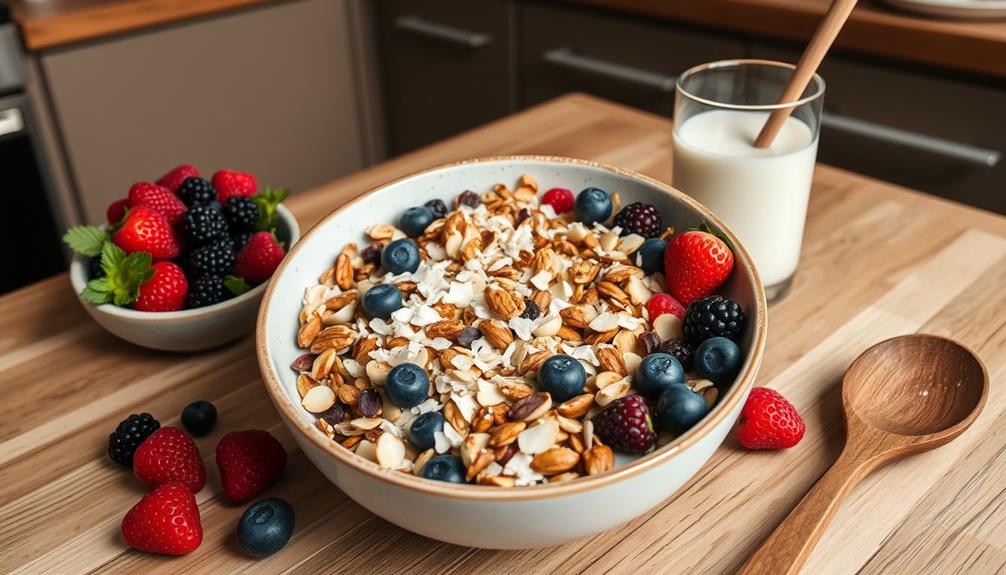You can have 20 to 50 grams of net carbs each day on a keto diet if you want to maintain ketosis. To calculate net carbs, subtract fiber and half of sugar alcohols from total carbs. Focus on non-starchy vegetables and healthy fats, while avoiding grains, sugars, and starchy foods. Be careful of hidden carbs in processed items, as they can disrupt your progress. Keeping a food diary can help you track your intake effectively. If you're looking for tips on how to stay on track and avoid common pitfalls, there's more to explore.
Key Takeaways
- The recommended daily net carb intake for maintaining ketosis is typically between 20-50 grams.
- Net carbs are calculated by subtracting dietary fiber and half of sugar alcohols from total carbohydrates.
- Foods high in antioxidants and low in carbs, like non-starchy vegetables, should be prioritized.
- Hidden carbs in processed foods can disrupt ketosis, so careful monitoring is essential.
- Keeping a food diary or using an app helps track carb intake effectively.
Understanding Keto Carbohydrate Limits

Understanding the carbohydrate limits of a keto diet is essential for anyone looking to achieve ketosis. To maintain this metabolic state, it's important to keep your net carbohydrate intake between 20-50 grams per day. Net carbs are calculated by subtracting fiber and half of sugar alcohols from total carbohydrates, giving you a clearer picture of how carbs affect your blood sugar. Staying within this recommended limit allows your body to shift from using glucose to burning fat for fuel.
Additionally, incorporating foods high in antioxidants, like celery juice, can support your overall health while on this diet.
Meal planning plays a significant role in managing your carbohydrate intake. You'll want to focus on low carb options, prioritizing non-starchy vegetables that are rich in nutrients yet low in net carbs. Foods like leafy greens, broccoli, and cauliflower should be staples in your diet.
Be aware that different foods can have varying impacts on your net carb counts, so consistent monitoring is key. Hidden carbs in processed foods can easily derail your efforts if you're not careful. By understanding these limits and making informed choices, you can enjoy the health benefits of the keto diet while staying on track to achieve and maintain ketosis.
Calculating Net Carbs

Calculating net carbs is essential for staying on track with your keto diet. To determine net carbs, you subtract dietary fiber and half of the sugar alcohols from the total carbohydrate amount in a food item. This calculation helps you maintain your daily net carb intake, typically limited to 20-50 grams for effective ketosis.
Here's a simple table to illustrate the concept:
| Food Item | Total Carbs (g) | Dietary Fiber (g) | Sugar Alcohols (g) | Net Carbs (g) |
|---|---|---|---|---|
| Example Food 1 | 20 | 8 | 5 | 12.5 |
| Example Food 2 | 15 | 5 | 4 | 10 |
| Example Food 3 | 30 | 10 | 6 | 18 |
While tracking net carbs, be mindful of hidden carbs in processed foods that can exceed your daily limit. Keeping a food diary can help you consistently monitor your intake and avoid pitfalls in your ketogenic diet. By accurately calculating net carbs, you'll be better equipped to stick to your keto goals.
Foods to Include and Avoid

When you're following a keto diet, it's crucial to fill your plate with the right foods while steering clear of those that can throw you off track. Aim for a daily intake of 20-50 grams of net carbs to maintain ketosis.
Focus on high-fat options like avocados, nuts, seeds, and fatty fish such as salmon. These foods aren't only delicious but also provide healthy fats and are low in net carbs. Additionally, incorporating essential oils for health can support your wellness journey. Non-starchy vegetables like spinach and broccoli are excellent choices, too.
On the flip side, there are certain foods to avoid. Steer clear of high-carb options like grains, sugars, starchy vegetables such as potatoes, and most fruits, particularly bananas and apples. These can easily disrupt your carb limits.
While lean proteins like chicken and turkey can be included, be cautious with your protein intake, as excessive amounts may interfere with ketosis. Prioritize healthy fats from sources like olive oil, coconut oil, and butter, while avoiding unhealthy fats like trans fats found in margarine and processed oils.
Monitoring Ketosis and Carb Intake
Monitoring your carb intake and ketosis is vital for staying on track with your keto diet. To maintain a state of ketosis, you should limit your daily net carbs per day to 20-50 grams. Remember, net carbs are calculated by subtracting dietary fiber and half of sugar alcohols from total carbohydrates in your food. A focus on effective strategies for weight loss can enhance your overall success on the keto diet.
Tracking food intake is a valuable strategy to guarantee you stay within your carb limits. Using a food diary or app can help you identify hidden carbs, especially in processed foods that may disrupt your ketogenic diet.
Additionally, monitoring ketosis through urine ketone strips or blood tests allows you to confirm whether your body is producing ketones, indicating you're in ketosis.
As you progress towards your weight loss and health goals, regular adjustments to your carb intake might be necessary. Everyone responds differently to the keto diet, so it's important to fine-tune your approach based on how your body reacts.
Common Mistakes to Avoid

Staying on track with your keto diet isn't just about monitoring your carb intake; it's also important to be aware of common mistakes that can derail your progress. One key pitfall is underestimating hidden carbohydrates in processed foods, sauces, and dressings. These can quickly push you over your daily net carb limit of 20-50 grams.
Additionally, it's vital to understand your budgeting for groceries to guarantee you're buying keto-friendly foods without overspending.
Another mistake is eating too much protein. Overconsumption can lead to gluconeogenesis, where excess protein is converted into glucose, disrupting your ketosis.
Additionally, insufficient fat intake can prevent your body from entering ketosis, as the ketogenic diet requires about 70-80% of your total calories to come from fats.
Don't forget to track net carbs accurately by subtracting fiber and half of sugar alcohols from total carbohydrates. Failing to do so can hinder your diet adherence.
Finally, staying hydrated is essential. Neglecting hydration can lead to the "keto flu," causing fatigue and irritability. To succeed on your high fat diet, keep an eye on your water intake and maintain electrolyte balance.
Avoid these common mistakes, and you'll enhance your chances of thriving on your ketogenic diet.
Frequently Asked Questions
How Many Carbs Can I Eat and Stay in Ketosis?
To stay in ketosis, you need to limit your daily net carbs to 20-50 grams. Track your intake carefully, as consuming too many carbs can prevent your body from burning fat efficiently.
Can You Lose Weight on 50 Carbs a Day?
You might find it interesting that participants on low-carb diets lost an average of 13% of their body weight in just eight weeks. Yes, you can lose weight on 50 carbs a day if you stay consistent!
What Do 50 Grams of Carbs Look Like on Keto?
When you think about 50 grams of carbs on keto, picture two cups of spinach, a medium avocado, and a cup of cauliflower rice. Keeping track of net carbs helps you stay within your limit.
Can I Have 100 Carbs a Day on Keto?
If you're considering 100 grams of carbs daily, it's likely too high for keto. Sticking to 20-50 grams is essential for maintaining ketosis and promoting effective fat burning. Adjust your intake accordingly for better results.
Conclusion
In the delightful journey of the keto diet, you'll find that managing your carb intake is key to revealing your body's potential. While you might be tempted to go a little overboard with those sneaky carbs, staying mindful helps keep you in that blissful state of ketosis. Remember, it's all about balance and making smart choices. So, embrace the adventure, savor the flavors, and enjoy the transformation as you navigate your way to a healthier you!









